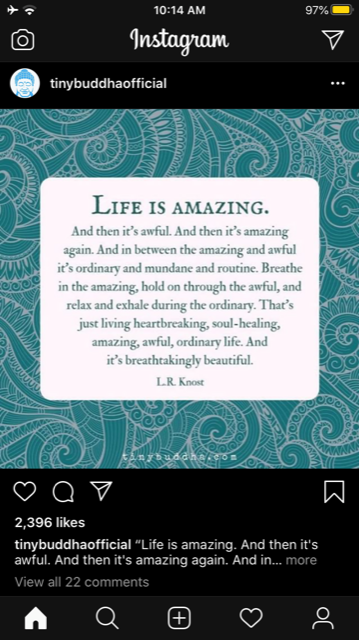As a pretty classic INFP on the Meyers Briggs scale, I’m a big believer in feelings. And as a professional, they’re the only thing we brand strategists trust. You think you can rationally persuade or fact-based-argue your way into getting people to buy something? No chance. To make someone choose you, you have to make them want you. And it’s our emotive, unconscious, lizard brains that want. Our rational brains know a lot of stuff. All the facts stored in there make us nod our heads in agreement. But our feelings make us move.
A few months ago I was desperate to turn off my feelings. My years of being an endurance athlete have given me a pretty high tolerance for pain. But there are only so many mornings you can wake up feeling terrible and keep plodding. Everyone who cared about me assured me that I’d come out on the other side. There was a reason for all of this, I just couldn’t see it yet. They promised I’d emerge stronger and wiser and primed for the all great things that were destined to happen to me. I appreciated that they said it. Someday their words might prove to be fact. But I didn’t feel it. Not one bit.
I saw Ariel Levy was coming out with a piece in the New Yorker called “A World Without Pain” and I was psyched for it. Her 2013 article “Thanksgiving in Mongolia” is the most moving thing I’ve ever read. YES, I thought. This woman has been through some serious shit and made her way out of it. This is a chick whose take on feelings I can trust. The opening hooked me and I was ready to have my mind blown:
We like to think that what doesn’t kill us makes us stronger, or more resilient, or…something. Deeper. Wiser. Enlarged…no pain is too great to be good…to be a person is to suffer.
Yup, I’m tracking. Ariel – we are simpatico. I read on.
But what if our worst feelings are just vestigial garbage? …Religion, art, literature, and Oprah have convinced us that [excruciating feelings] are valuable…Pain is what makes joy, gratitude, mercy, hilarity, and empathy so precious. Unless it isn’t.
Um – what?
Paul Bloom, who is writing a book about suffering, told me, “There’s a big movement in psychology to say, ‘What doesn’t kill you makes you stronger.’ People talk about ‘post-traumatic growth.’ I think a lot of it is bullshit. Look at the data: bad things are bad.” You aren’t healthier after you have cancer or fall down a flight of steps. And it’s only in the movies that getting hit by a bolt of lightning turns you into a superhero; in life, it turns you into a fritter.
Okay this was not good. My heart is analogous to a complex bone structure that gets flung down the stairs, shatters, and then heals up all crooked and weak? There’s little to no chance I can emerge from this whole thing stronger or smarter because…data? I feel horrendous and…the end? AM I A FRITTER?!? Ariel. We are through.
It was a bipolar reaction that was becoming familiar to me. I listened to podcasts my friends recommended, only to end up wanting to throw my (work-issued) laptop across the room (I want to feel more than 10% happier, Dan Harris!). I followed Tiny Buddha on Instagram. Sometimes that made me feel better.
Sometimes it made me think, Eff you, Tiny, you don’t know what I’ve been through.
When you start cursing at a meme it’s a decent sign you need something stronger.
Then something stronger happened. I went on to Facebook for the first time in weeks and weeks and saw that a friend from college had posted about something called The Desire Map. Part pop-Buddhist reading, part workbook. Designed to help you identify and define your Core Desired Feelings: the 3-5 feelings, of all the feelings in the whole world, that you most want to feel in your life. She raved about it.
It sounded intriguing enough for eleven dollars. I spontaneously ordered it on Amazon. I forgot I ordered it almost as quickly. I checked my mailbox days later, just minutes before I hopped into the Uber for New Zealand…and there it was. So I took it, stuffed it in my carry-on, and pulled it out on the plane.
And there wasn’t one day I spent on the other side of the world, or in transit, that I didn’t read or work on it.
The premise is that the way we plan our lives is upside down. We make lists of things we want to achieve, milestones we want to hit, and places we want to go - but what’s actually driving all that stuff is a deep underlying desire to feel a certain way. The trick is to dig beneath the bucket list items and resolutions, uncover the feelings you most want to have driving your body and mind, and instead pursue those. Chances are you’re already doing things and surrounding yourself with people who help you experience those core desired feelings. And in areas of your life where you’re not feeling them? Well, it’s probably time to start thinking about a change. *Beware in particular the feelings that require outside circumstances or people - a boss’s validation to make you feel competent or a man’s attention to make you feel adored. Core Desired Feelings are the ones that we, and we alone, have the power to cultivate and generate for ourselves.
Are you eye-rolling yet? I was. Until I started to do it. I won’t bore you by explaining all the exercises in the book; I won’t do them justice. But I’ll share with you the Core Desired Feelings that it turns out are most important to me. And I’ll admit in advance that the final exercise in the book that gets you to define and declare them is English major catnip. You’re instructed to pull out your dictionary and thesaurus. You make sure every Feeling word you choose actually means what you think it means. Double check that the Middle English roots of Feeling #3 don’t piss you off. Is there a synonym for #2 that lights you up even more? It was fun. And it made me feel good, for long stretches of time, for the first time in a long time.
My Core Desired Feelings:
Independence: not influenced or controlled by others. Thinking and acting for myself. Not subject to another’s authority. Free. Not contingent on something else for existence.
Incandescence: glowing white with heat. Aglow with ardor and purpose. Brilliant, masterly, extraordinarily lucid.
Indomitable: cannot be subdued or overcome. Will, courage, unconquerable. Resolute and untamed.
Optimism: expect the favorable outcome. Good predominates over evil. Goodness pervades reality. This existing world is the best of all possible worlds.
Something happened to me when I used this book. Instead of wanting to un-feel, I started to be able to focus on what I did want to feel again. Then I could start to ask: does this activity or setting make me feel this way? Does thinking about this person or replaying this memory over and over make me feel this way? And if not…why are you doing it? Asking those questions made me feel a little bit in control again. And these beautiful words started to feel a little bit like mine.
Painful memories still come. Pointless wishing still happens. But when I feel my mind going there, I think about my Core Desired Feelings. I say them out loud when I don’t mind looking like a real weirdo. And in the hardest times, they come out sounding desperately rational. BUT. There have been other times – in a forest in New Zealand, walking out of a great meeting into the Cleveland sunshine, sitting quietly alone in my place and having that be kind of nice again – I can start to feel the words. I can start to believe them.
And (Ariel) I can’t think of much that’s more powerful – or precious – than being able to feel that this existing world is the best of all possible worlds. Feel that, and you can do anything. That seems like a reason for it all. One that will someday be worth the pain.







